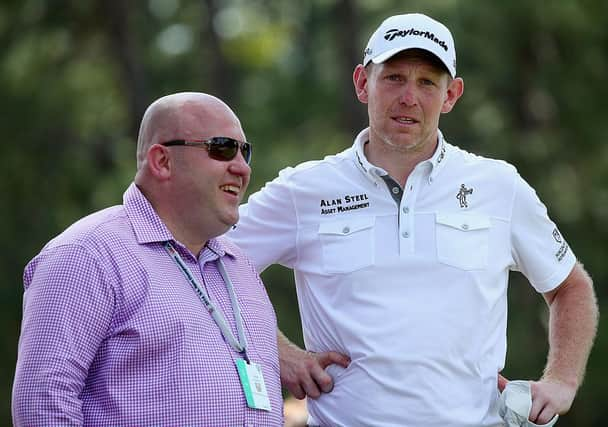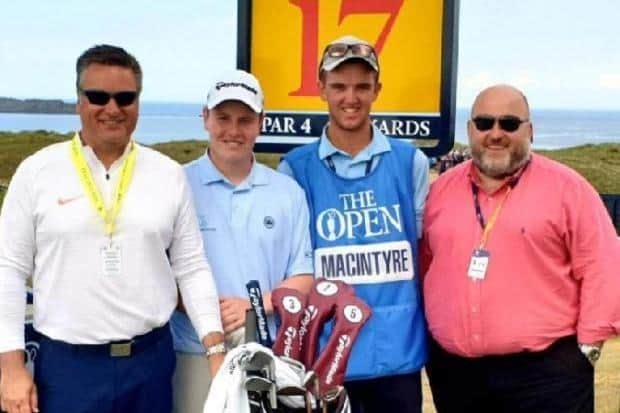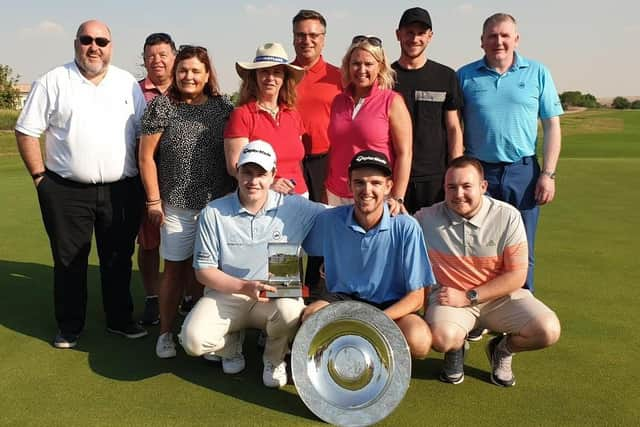Iain Stoddart on creating a Bounce-effect in Scottish golf


In that time, he has enjoyed some exciting times with Stephen Gallacher while also being at the heart of some ground-breaking initiatives that have benefited Scottish golfers in their bid to make progress in the professional ranks.
Stoddart spends a lot of time these days at Bob MacIntyre’s side at events following his meteoric rise up the world rankings, but he is equally excited about what lies ahead for Calum Hill and Grant Forrest among others in the Bounce Sport stable.
Where did you get your passion for sport?


Advertisement
Hide AdAdvertisement
Hide AdIS: Wow. I was just like every other wee boy, to be honest. I played football, rugby, golf, anything really as a kid growing up in Edinburgh. It was mostly playing football in the street, but we would also play tennis when Wimbledon was on and I’d be at a golf course with my pals, friends to this day, like Grant and Fraser Pollock, when The Open was on. We all thought we were world-beaters (laughing) and that was basically where it all started for me in terms of having a passion for sport. Of course, as we all know, when you start working in sport, quite often the realities of it are maybe not exactly what you had expected due to everything that goes on in the background - the politics etc. People probably look at sport as being an isolated world in life, but it isn’t, really.
So, when you left school, did you have a vision of where you wanted to end up in sport?IS: Not really. I worked as a chef when I left school and also worked in the Commonwealth Games Athletes’ Village as a kitchen porter when I was still at school. You are not going to do something like that for the love of it as you are still washing a pot, whether it’s for Usain Bolt or not (laughing). I then had some jobs in sales before going to Australia to work in marketing for Coca-Cola. When I came back, I had a restaurant before I started to work for David Murray at Carnegie, where I was involved in hospitality, trackside advertising etc. That’s where it all started for me, really.
You then founded Bounce Sport with Derek Ritchie, who had also worked at Carnegie around 2001/02. What did you aim to achieve at the outset?
IS: Golf wasn’t the only thing we planned on doing. We were going to look at a number of things, but there was a commercial gap in golf in Scotland at the time. Due to the fact we were not established at the time, we thought the best way was to go and work with the players coming through and build up that side of things and that has stuck with us to this day. As that evolved, an opportunity came along with the Challenge Tour as there was a commitment within the deal for the 2014 Ryder Cup that Scotland was to deliver a Challenge Tour event and it was to have a four-year legacy up to 2018.


Advertisement
Hide AdAdvertisement
Hide AdYou are referring, of course, to the Scottish Challenge, which started in 2006 at Murcar Links then had a short spell at Macdonald Cardrona before being held for 10 years at Macdonald Spey Valley in Aviemore?
IS: Yes. We were looking at a Challenge Tour event at the time as we could understand the benefit of that. Our job was effectively to dilute the Scottish Government’s investment to bring in commercial partners and we definitely achieved that by bringing in strong partners in SSE and Macdonald Hotels alongside the Scottish Government and the European Tour. We always look at the end of an agreement, not the start, because you want to make it the easiest conversation in the world to keep it going as opposed to people saying you didn’t do this, you didn’t do that. You always aim to over-deliver and to make sure people are getting what they want from a partnership or association and we had 13 Challenge Tour events with strong sponsors on board.
The event was last held in 2018. Why was that?
IS: It came to an end then because of a lot of factors. The Scottish Government’s commitment to the event was no longer there as the four-year legacy after the Ryder Cup had come to an end. In addition, SSE were changing their retail offering. Their dynamic was changing, as was Macdonald Hotels. In actual fact, it was the natural end of the tournament and we will always try to resurrect it. We were beginning to get close to a couple of things, but then Covid came along.
How pleasing was it to see someone like Brooks Koepka winning in 2013 and using that as a springboard to become a four-time major winner?
Advertisement
Hide AdAdvertisement
Hide AdIS: There were lots of great winners. Brooks, Andrew 'Beef' Johnston and also Scottish winners in Jamie McLeary, George Murray and, in the last one in 2018, David Law. It had a bit of everything in its time and lots of great guys played in it, including Tommy Fleetwood, the Molinaris, Bernd Wiesberger, Matteo Manassero, plus loads more.
In terms of player management, you started off with Andrew Oldcorn then had David Drysdale on your books?
IS: Yeah, that was our entrance level in golf and got our face known.
Stephen Gallacher then came on board. Was it perhaps a game-changer for the company as he won the Omega Dubai Classic back-to-back in 2013 and 2014, when he played in the Ryder Cup at Gleneagles?
Advertisement
Hide AdAdvertisement
Hide AdIS: I would like to think we have helped Stevie along the way although his achievements on the golf course, like everybody, is down to himself . It was all about scenarios around 2013 and 14, what happens with this, what happens with that. In 2014, America was like going down to the shops we were back and forth so often (laughing) and he really, really chased it, to the point, perhaps, that he was maybe exhausted by the time the Ryder Cup came along.
Stephen was in attendance at Edinburgh Castle in 2011 when you were behind the launch of Team Scottsh Hydro, which helped a number of players secure European Tour cards. Tell us about that initiative?
IS: Team Scottish Hydro was designed so that rather than going to company X and introducing them to player A, it was a case of us going to company X and getting them to support the initiative and what we were doing and let us worry about who the individuals would be as they would self identify themselves. The one constant throughout Team Scottish Hydro was that every player in the frame got a chance. There was funding there for them. Okay, it was a good few quid although deliberately not a king’s ransom, but it was enough to get them out there and if you were good enough, you were going to kick on. It was as simple as that.
You then joined forces with Scottish Golf to create a support package designed to smooth the transition of young players to the pro ranks, with the likes of Bob MacIntyre, Grant Forrest and Ewen Ferguson all benefitting from that as they played in Challenge Tour events as amateurs. What was the thinking behind that?
Advertisement
Hide AdAdvertisement
Hide AdIS: Because we’d seen first hand the guys coming out of the amateur ranks, we began to realise that, in actual fact, even what we were prepared to help them with, they weren’t coming to a starting point with any sort of knowledge of what they were getting themselves into. It needed someone to get people speaking. Knowing the Challenge Tour system worked with invitations, I was going to Alain de Soultrait, the director of the Challenge Tour at the time, to ask if we could use an element of our invitations for amateurs. The whole ethos and idea of that was for them to go and get some playing experience, at tournaments both on and off the course. They were seeing faces that they now see on a regular basis. Stuff that would now be taken for granted. Who the tournament directors were, registration, scoring. It was aimed at helping them be ready for when they were back out there under the gun and being able to hit the ground running. It was about trying to make some of the stuff that can be daunting less daunting when the time came for them to be in the professional ranks. By the way, it was only a choice for these players. Our offering was to put the seed in the ground at the outset and grow the tree as opposed to what is the easy way and coming along and pruning it when it is fully grown.
How satisfying is to see Bob MacIntyre now in the world’s top 50, as well as Grant Forrest and Calum Hill and other players you now manage also doing well on the European Tour?
IS: Hugely but, at the same time, a management company doesn’t hit a shot. These guys hit the shots and have got to where they are by the power of their own hands. But, what you can do is put the best foundations and best practices in place in the background, so that as it grows, you are not sitting there thinking as things happen, ‘what do I do now?’ It is actually charted and it’s just a case of working in line with that and us working in line with that. Bob has now broken from the pack if you like, due to him sitting in the world’s top 50 and the conversations we are now having around him are with international brands, not just Scottish companies.
It seems as though Bob has raised the bar over the past couple of years among the new wave of Scots on the European Tour?
Advertisement
Hide AdAdvertisement
Hide AdIS: As it stands, yes, and his results show it. But, across our whole group, I know how hard they all work every day as I know pretty much every day what they are up to. I know the sacrifices they make, their commitment and you really couldn't ask for any more from every single one of them. Bob is the one who has broken away at the moment, but we have high hopes for them all, we genuinely do.
You are a bubbly, friendly and sociable character. How important is that in your relationship with the players?
IS: No matter what line of work you are in, you have got to get on with the people you are working with. The minute that’s not the case, then there’s a problem. The best way to put it is that you are there when it’s sunny and give them an umbrella but you don’t take it away when it starts raining. You are side by side whether it’s a win, lose or a draw. We will fight tooth and nail for them. There’s also no reason why just because most of them are from wee places in Scotland, that doesn’t mean they shouldn't feel they can take on the best players in the world. Do you think there is a wee town in America where they are generating world No 1s? There’s not. That’s why I keep telling them not to be scared to take on anybody or anything. Quite often in Scotland we beat ourselves up, always the bridesmaid. To hell with that – let’s take them all on.
Tell us about a new ‘buddy’ system that has been devised to allow the Bounce Sport players to pass on help and advice to talented youngsters coming through the ranks in the Stephen Gallacher Foundation?
Advertisement
Hide AdAdvertisement
Hide AdIS: It was only 10 minutes ago that a lot of our guys were in that position as amateurs and I think we are in line with that with Scottish Golf. We have players who have been in America and gone through the college system and we are now seeing young players who are about to go to college in the US. They have to work out how to do that with their parents. The mentoring thing is as much for parents to speak to other parents as the players speaking. Gregor Graham’s mum, for example, was able to ask Calum Hill about an insurance issue and that helped her tick a box. Stephen has his 25 years plus on-tour knowledge which he is willing to share to them all and it all simply makes sense.
Iona Stephen, who works for Sky Sports Golf, is also involved in that as a buddy to Carys Irvine, one of the foundation’s ambassadors. How did that come about?
IS:
The Stephen Gallacher Foundation has been a massive success, which has been a huge team effort from top to bottom. Ten years in, we are beginning to see players who picked up a club for the first time through the foundation and, as well as helping golf clubs by ticking a box and supplying them with new members, it is also great to see people wanting to have a career in the golf industry. We’ve got guys and girls who are showing great talent while the Carys and Iona link is also fascinating. Iona started out as a professional and is now in the media and Carys is a superstar in as much as she truly is an ambassador for the foundation and is wanting to pursue a career that is more in line with Iona’s. Iona was hugely impressed with the idea when I approached her. One phone call and she said ‘yes’ straight away and they speak on a regular basis.
You play your own golf at Royal Burgess in Edinburgh. What have you made of the membership boom at golf clubs in the past year?
IS:
Advertisement
Hide AdAdvertisement
Hide AdWho would have thought that a global pandemic would have been golf’s biggest recruitment tool? Scottish Golf comes in for criticism from time to time and people can pick holes in anything. But, in my opinion, it’s not for a lack of wanting to be well-intentioned. The next thing, of course, and it’s the responsibility of the golf clubs as much as anyone, is to keep these new members. The trophy courses around the country that rely on the American visitors are quiet at the moment. But they will come back full steam ahead. Where the benefits have come are for the smaller clubs and now they have not only attracted new members but also got some people back, it’s about making sure you are providing a good service for them and making sure they are feeling welcome and being looked after.
As a kid, you maybe dreamt about being a top sportsman yourself, but is what you do the next best thing?
IS: It’s a pleasure and a privilege, for sure. It’s not a coach, it’s not a caddie, it’s not a manager, it’s not a parent, it’s not a girlfriend, it’s not a pet or anything that goes out and hits the shots. It is only the player. We can only play our part and we are pleased and privileged to play our part. But it is never about us. We know what we do and the most important thing is that the players know what we do. We prefer to keep the head down and simply be the mechanics in the background and, in our company, the unsung hero right now isn’t me or Del, it’s Alex Marshall. She’s the girl who gets everybody from A to B across the world and, at right now, as you will imagine due to Covid, that is the real challenge due to protocols etc.
A message from the Editor:
Get a year of unlimited access to all of The Scotsman's sport coverage without the need for a full subscription. Expert analysis, exclusive interviews, live blogs, and 70 per cent fewer ads on Scotsman.com - all for less than £1 a week. Subscribe to us today https://www.scotsman.com/subscriptions/sports
Comment Guidelines
National World encourages reader discussion on our stories. User feedback, insights and back-and-forth exchanges add a rich layer of context to reporting. Please review our Community Guidelines before commenting.
